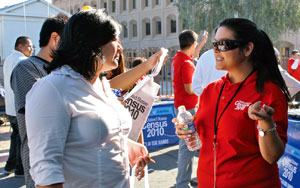U.S. Census road tour visits Phoenix
By Colton Shone
Special to the Times
PHOENIX, Jan. 7, 2010

(Special to the Times - Colton Shone)
Rosalind Tayah, left, of Phoenix, is informed about the U.S. Census by a volunteer. The U.S. Census Traveling Road Tour stopped in Phoenix Jan. 5 at the Native American Community Service Center to urge people to participate.
If you think you don't count, the U.S. Census Department wants you to think again.
The U.S. Census Traveling Road tour stopped in Phoenix at the Native American Community Service Center Jan. 5. A few hundred people showed up at the center asking questions about the census.
The federal government wants to make sure everyone living in the U.S. is accounted for. In order to ensure the closest estimates possible, the government kicked off the road tour campaign to advise people in the community to participate. The stop in Phoenix is just one of many on its 150,000 mile trek that runs January through April.
The Native American Community Service Center is comprised of three agencies: the Phoenix Indian Center, Native American Connections and Native Health.
The departments have formed the American Indian Complete Count Committee for Maricopa County. Department representatives will focus on promoting the census to the urban American Indian population in hopes of getting a stronger count.
"We want every American Indian living in urban cities and on the reservation to be counted," said Native American Connections CEO Diana Yazzie Devine.
She said that it is important to count the population because it would help secure funding for federal projects in the community, like housing initiatives, and sets the stage for public policy.
You will be asked about your race when you get your census forms.
"If you are Native American make sure you mark the appropriate section," Phoenix Indian Center CEO Patricia Hibbeler said. "Make sure you mark your federally recognized tribal affiliation name or it will not count."
She said it does not help your community if you mark the wrong tribal affiliation.
"For example there are San Carlos Apache and White Mountain Apache. You do not want to mix those things up," Hibbeler said.
Shalyah Ben, 25, Navajo, understands that it is important to be counted in the upcoming census, but says she can see why older Natives might not want to participate.
"I think it's a generational thing. A lot of the elders don't see the federal government in good light because of what they've been put through by them," Ben said.
"The census is completely safe and confidential," said Hibbeler.
She's right. Census Bureau employees could face huge fines and receive time in prison for releasing information.
The census forms will be sent out in March and recipients are required to fill it out and send it back in the postage-paid envelope by April 1. If the form is not sent in by the deadline, you will get a knock on the door from a census worker who will get the information from you directly.
The Census Department says the form asks 10 questions and should not take any longer than 10 minutes to fill out.

